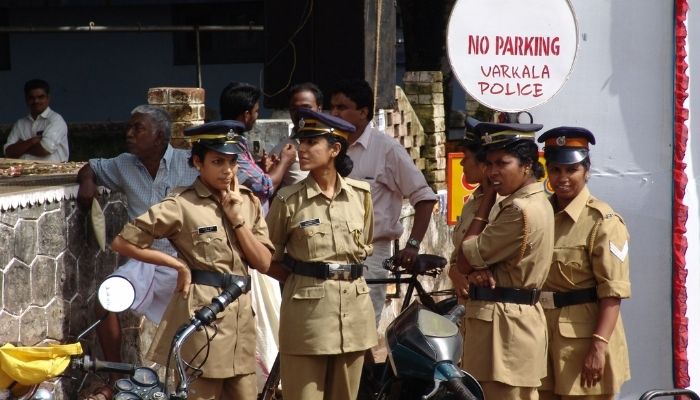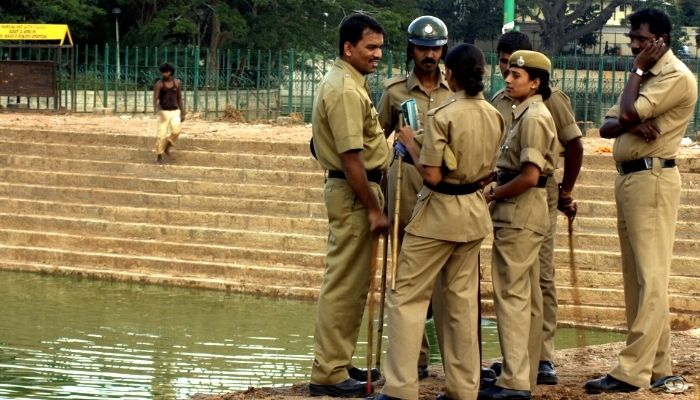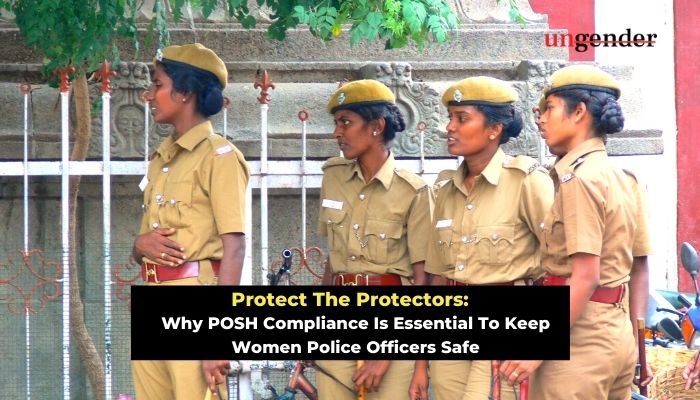Written by: Sheena Verma
Like a lot of other institutions in our country, women are grossly underrepresented in the police force. According to the Bureau of Police Research and Development (as of 2020), women account for only 8.98 percent of India’s police force. This falls short of the target of 33 percent women participation set by the Home Ministry in 2009. It is not surprising that most of these women occupy entry-level positions like constables, with only one percent at supervisory positions. Even the ones that make it to the police force are mostly working on in-house tasks, such as the maintenance of files/data, and not field-based tasks, like patrolling, law and order, etc.
According to the World Bank, India’s global rank on the Women’s Workplace Equality Index in 2018 was as low as 102. According to the updated index in 2020, we’re further down to 117.
These appalling numbers not only reflect the state of gender equality but also significantly impact the state of law enforcement in the country. A 2011 report by UN Women titled, ‘Progress of the World’s Women: In Pursuit of Justice’, states that approaching male police officers can be particularly difficult and sometimes impossible for women.
There are certain duties that mandate the presence of a woman police officer. For example, Section 51 of the Code of Criminal Procedure provides that a female can be searched only by another female. More number of women police officers could also mean lesser instances of unwarranted use of police force.
A study published by the Journal of Criminal Justice reveals that suspects arrested by women police officers were less likely to be injured. The statistics suggest that the law enforcement mechanism cannot function properly without adequate female presence in the force.
Sexual harassment in the police department discourages women from seeking jobs in the force, which directly has an impact on the criminal justice system in the country. In this article, I address the police department’s poor compliance with the sexual harassment law, and what steps can be taken to improve the situation.

Sexual Harassment of Women Police Officers
The police department instead of working towards making police services a suitable and safe career option for women continues to fail its current female employees. Sexism and sexual harassment seem to be common within the police department across the country. Over 150 police personnel in Delhi alone are under investigation for rather grave crimes, such as rape, stalking, sexual harassment at workplace, and molestation.
In January 2020, a UP woman police officer posted a video on social media, complaining of sexual harassment by her seniors and how she was not even allowed to register her complaint. In the video, she is also seen asking how she could protect other women when she herself was denied justice. Instances like these have become commonplace in the absence of proper gender sensitization initiatives.
Ungender spoke to a woman officer at the post of Station Head Officer (SHO) of an all-women police station in Haryana. “Setting up of women police stations have encouraged female victims to report crimes without hesitation. Complaints of domestic violence and stalking have increased dramatically”, she said. While talking about her initial years in police service, she said, “It was undoubtedly tough to survive in a male-dominated workplace. We [women officers] did not even have separate washrooms. Sexist conduct was common and male colleagues and supervisors would often disregard our work.” On being asked about her thoughts on how police stations could be more inclusive, she said, “The government should reserve adequate seats for women and more all-women police stations should be set up.”
Police stations fall under the ambit of the Sexual Harassment of Women at Workplace (Prevention, Prohibition and Redressal) Act, 2013, and therefore, are obligated to comply with its provisions. The Act mandates the setting up of an Internal Complaints Committee (ICC) to address complaints of sexual harassment at workplace. This is accompanied with mandatory awareness initiatives to be undertaken by the employer. Section 2(g) of the Act defines an employer as the head of any department, branch or unit of the appropriate government or a local authority.
In this case, the Station Head Officer would be the employer and would be responsible to ensure the station’s compliance with the Act. However, these requirements are rarely implemented due to the lack of proper mechanisms to ensure enforcement. According to the Status of Policing Report in India, 2019 (hereinafter, Report), one in four women police officers said there was no sexual harassment committee in their police station/workplace.

Most women officers do not report such instances because of fear of further harassment. In fact, a woman officer, who mustered up the courage to report an incident of sexual harassment to her superiors, said that she was openly harassed after the officer in question was let off with a mere warning. She then reported to the commissioner, who referred the case to the internal sexual harassment committee.
Months later, as many as 24 police women came forward alleging similar behaviour at the hands of the same officer. Even after accusations from at least 25 women officers, a serious inquiry was initiated only after the complaints were made public.
Another factor contributing to rampant sexual harassment is the lack of awareness among the officers. Women police officers at constabulary positions may not even be aware of what constitutes sexual harassment under the POSH Act. According to the Report (supra), women police officers at higher ranks are more likely to report gender-related discrimination and harassment.
For this reason, the Act duty-bounds all employers to conduct training programs to create awareness among the employees. Moreover, all police stations are required to have a poster, stating the rights and duties of the officers. However, none of this is actually carried out. Cognizant of the disappointing state of affairs, the WCD Minister – Maneka Gandhi, in 2018, wrote to the Home Minister urging him to issue directions to form ICCs in all the police stations. However, there is no information to corroborate that this has been implemented.
Protect the Protectors
Ironically, women police officers are among the most vulnerable to workplace harassment. Even though setting up of all-women police stations is the right step towards making the justice system more accessible to victims of sexual harassment, it hardly improves the status-quo for women police officers serving in male-dominated stations. There is a dire need for stricter implementation of the Vishakha Guidelines. This can be ensured by establishing proper enforcement mechanisms that trace the police department’s level of compliance with the POSH Act.
The DGPs of each state should be made answerable in case of default. On a more local level, gender sensitization drives should be conducted for officers at all levels. Women officers should be encouraged to report instances of harassment, even if they involve high-ranking seniors.
It has been almost seven years since the POSH Act came into force. Yet, the primary law enforcement agency of the country has failed to comply with it. This acts as a major disincentive for women seeking jobs in police services, which in turn worsens the male to female ratio in the police force. The Ministry of Home Affairs should work together with the Ministry of Women and Child Development with the aim of making police stations a safer workplace for women.
About the author: Sheena Verma is a third-year student at National Law School, Punjab with an interest in gender laws and competition law.
Images used for representation only.
Credits: Bryce Edwards, Samuel Raj, Flying Cloud/Flickr
Ungender Insights is the product of our learning from advisory work at Ungender. Our team specializes in advising workplaces on workplace diversity and inclusion. Write to us at contact@ungender.in to understand how we can partner with your organization to build a more inclusive workplace.








